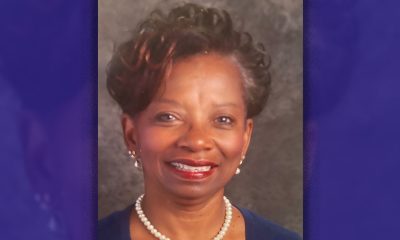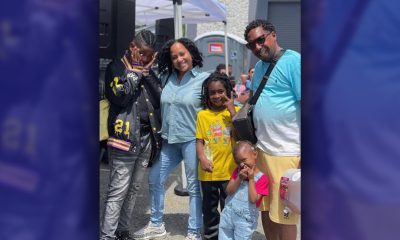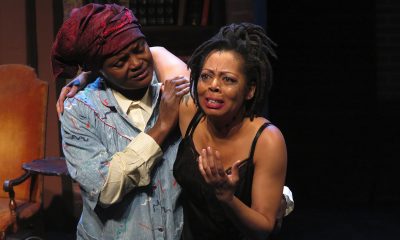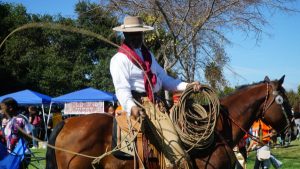Arts and Culture
KOLA: An Afro Diasporic Remix of the Nutcracker
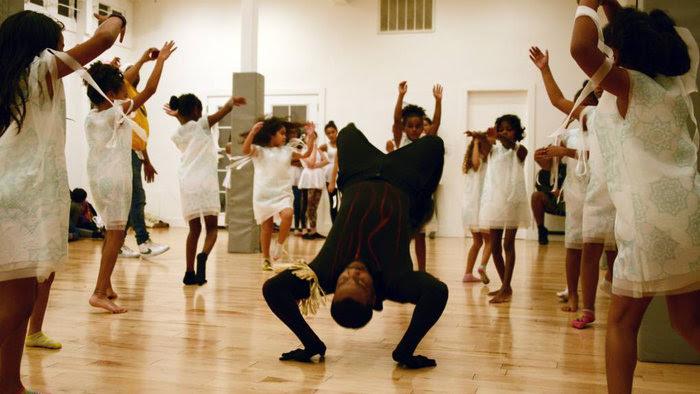
In “KOLA: An Afro Diasporic Remix of the Nutcracker” — we meet Nzingha, an orphan, who lives with her grandparents. Actor Makeda Booker’s character doesn’t remember her mother and resents her abandonment. Though she knows her grandparents — actors Dame Drummer and Jennifer Jones, love her, the child feels a sense of isolation at the family holiday party and spends time playing games on her phone. While everyone mingles, then dances, Nzingha moves awkwardly when her Uncle Victor (James “Banks” Davis), whom she hasn’t seen in a while asks her to join him. The next day, he seeks his niece out as she does her chores, and shares with her stories of his sister, her mother.
And so begins the journey where Nzingha, guided by Uncle Victor, transformed into Esu (the Orisha of the Crossroads) takes her on a Sankofa journey so she can grasp her historic past to better understand her present.
Set to music by lead composer Kev Choice and others, KOLA is a wonderful opportunity to celebrate African resilience and fortitude. How many orphans like Nzingha were nurtured by adults in the journey across the water? How many were adopted when parents were killed or died or were sold off?
The cast is superb as the lead choreographer Rozz Nash sets work for this gifted ensemble. The battle between the Raccoon King and Capoeira King, is a highlight as the masked raccoons square off against the Capoiera posse. This dance is followed by the Resurrection where Nzingha meets tiny mythical snow angels, concluding in a grand finale: The Pantheon. End Act 1.
After a brief intermission where many in the audience go out to purchase KOLA bling, T-shirts and other swag, we see Nzingha on the shore where she meets fishermen and fisherwomen.
Crossing bridges made from bones, Nzingah dances through Bahia where she meets Yemanja—goddess of the salt waters, then into Cuba where she meets Oshun, goddess of love, and Ayiti where she dances Yanvolou, for Ogou and the ancestors known as Gede. It is a dance used to reinforce community and solidarity.
As Nzingha grows in self-confidence, she earns her elekes, or ritual beads, after she dances through each divine portal. The next stop is Southern Spain where Nzingha, also named for a warrior, meets Oya, the goddess of change and transformation. This stop is the beginning of the “great (re)turn,” this time accompanied by the deities Mamiwata, Obatala, and Esu. The child carries her nkisi, or charm, with her. She is wrapped in literal rainbows as she alights in New York at the African Burial Grounds (now Wall Street), dances into Congo Square in New Orleans then heads back to Oakland where the enchantment continues in Oscar Grant Plaza, where Nzingha meets her young grandparents. Home again, she meets her mother again in the mirror and embraces her as she embraces this episode of her journey, now complete.
For each leg of the literal journey master percussionists and other choreographers join lead choreographer, Rozz Nash and co-writer, theatre director, Ryan Nicole Austin – who was running the sound, opening night. 500+ students from more than a dozen Oakland and other East Bay schools are involved as performers, composers and costume/set designers, including OSA, Anna Yates, Northern Light, Pear Tree Community School, West Oakland Middle School, Envision Academy Middle Grades, Park Day, Head Royce, and Latitude High School.
Jennifer Johns is a co-writer and composer and also portrays both the grandmother and Mamiwata. Ultimately, it is through African divinity the orphaned Nzingha finds what she believes she lost. Once she steps into the chasm holding Esu’s hand or cane, it is trust that ultimately rewards Nzingha with the answers she seeks. Once she commits to the trip, she doesn’t let go until she reaches home, sweet home.
It is a beautiful story, one of hope and love. KOLA continues at Castlemont High School, Thursday, Dec. 19-22, 7 p.m. Sunday at 2 p.m. It is a family friendly production. For tickets visit www.thepeoplesconservatory.org
There is free parking on the side of the school campus by the fence near the childcare center signage. Keep driving all the way to the back.
Arts and Culture
Kedrick Armstrong: New Music Director for the Oakland Symphony
The Oakland Symphony Announced Kedrick Armstrong as its Next Music Director. In addition to conducting the orchestra’s public concerts, Armstrong will also actively participate in the Oakland Symphony’s many education and community engagement programs, designed to inspire a love of music in people of all ages.

By Post Staff
The Oakland Symphony Announced Kedrick Armstrong as its Next Music Director.
In addition to conducting the orchestra’s public concerts, Armstrong will also actively participate in the Oakland Symphony’s many education and community engagement programs, designed to inspire a love of music in people of all ages.
Armstrong is the successor to previous music director and Conductor Michael Morgan, who passed away in 2021 after a 30-year tenure at the Symphony.
Armstrong will open the Oakland Symphony 2024-2025 season on October 18.
Armstrong, who is 29 and hails from Georgetown, South Carolina, is currently the creative partner and principal conductor of the Knox-Galesburg Symphony.
The Chicago Tribune has praised Armstrong for his ability to “simply let the score speak for itself.” He enjoys a wide range of repertoire, spanning early music to premiering new works, using his joy and curiosity for all music to cultivate understanding and collaboration within diverse communities.
“I am deeply honored and grateful for the opportunity to serve as the new music director of the Oakland Symphony,” Armstrong said. “As a Black conductor, I find it humbling to stand on the shoulders of both Michael Morgan and Calvin Simmons,” the most recent and the first African American music directors of the Symphony, respectively.
Armstrong led three programs at the Symphony between 2022 and early 2024, which showcased his broad knowledge of the classical repertoire and enthusiasm for spotlighting diverse voices.
On his Oakland Symphony subscription debut on Feb. 16, Armstrong led the world premiere of “Here I Stand: Paul Robeson,” an oratorio by Carlos Simon on a libretto by Dan Harder, commissioned by the Oakland Symphony.
Armstrong was selected unanimously by the Oakland Symphony’s board of directors and musicians after an extensive two-year search. “The search committee was overwhelmed by Kedrick’s scholarship and curiosity about all kinds of music, from classical and jazz to gospel and hip-hop,” said. Dr. Mieko Hatano, executive director of the Oakland Symphony. “We are thrilled to have him join us at the Oakland Symphony.”
Arts and Culture
Faces Around the Bay Dr. Carl Blake, Pianist
Born in Liberty, Missouri, Carl Blake, a virtuoso and respected pianist, made his most recent migration to the East Bay in 1999. One might have seen him performing recently at Noontime Concerts in San Francisco, or at the Piedmont Center for the Arts in Oakland. He is Director of Music at The Church for the Fellowship of All Peoples in San Francisco. He was also co-organizer and collaborative pianist at Herbst Theater for The Majesty of the Spirituals concert in 2022 and has held several church positions in the Bay Area.

By Barbara Fluhrer
Born in Liberty, Missouri, Carl Blake, a virtuoso and respected pianist, made his most recent migration to the East Bay in 1999.
One might have seen him performing recently at Noontime Concerts in San Francisco, or at the Piedmont Center for the Arts in Oakland. He is Director of Music at The Church for the Fellowship of All Peoples in San Francisco. He was also co-organizer and collaborative pianist at Herbst Theater for The Majesty of the Spirituals concert in 2022 and has held several church positions in the Bay Area.
Blake obtained a Bachelor of Music from Boston University and continued post-baccalaureate studies in Jamaica before earning a Master of Arts in Music at San Jose State University. He was the recipient of two Fulbright residencies in Honduras and completed a third residency at the University of St. Petersburg in Russia. He has a Doctor of Musical Arts from Cornell University.
At age 19, Blake, then an undergraduate piano major at Boston University, was “discovered” by Impresario Dr. W. Hazaiah Williams, who is the Founder and Director of Today’s Artists/Four Seasons Arts.
Williams honored Blake by awarding him the first Marian Anderson Young Artist Award. Anderson personally presented the award at the Masonic Auditorium in S.F. Subsequently, Blake was presented by Dr. Williams in his San Francisco debut at The Herbst Theatre. Williams subsidized a year of study abroad for Blake at the Paris Conservatory of Music. Additionally, Williams sponsored Blake’s New York Weill Hall debut, where he has performed twice since. Blake performed several times at the Yachats Music Festival in Oregon.
Blake continues to perform nationally and abroad. His hobbies are reading, baking and travel. He says, “I’m still pumping ivories, as Belgian pianist Jeanne Stark described the disciplined practice of concert piano.”
Arts and Culture
Oakland Jazz Great Offers Master Class as City Declares “John Handy Day”
World-renowned jazz master saxophonist John Handy, a McClymond’s High School graduate, was presented with a Mayor of Oakland Proclamation declaring Feb. 12, as John Handy Day in the city. Handy is most notably known as the featured saxophonist for Charles Mingus on “Goodbye Pork Pie Hat” from the album “Mingus Ah Um” (1959) and on “Hard Work” from his own album “Hard Work” (1976).
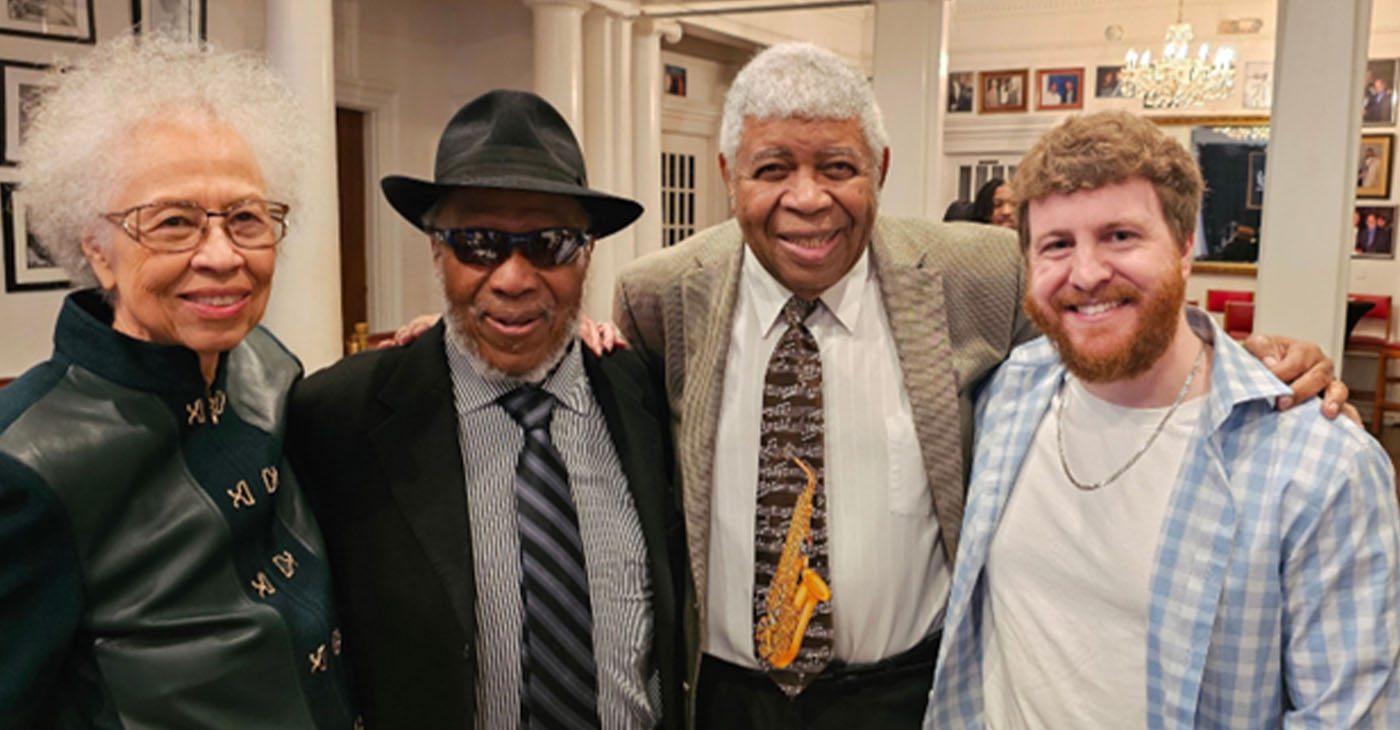
By Conway Jones
World-renowned jazz master saxophonist John Handy, a McClymond’s High School graduate, was presented with a Mayor of Oakland Proclamation declaring Feb. 12, as John Handy Day in the city.
Handy is most notably known as the featured saxophonist for Charles Mingus on “Goodbye Pork Pie Hat” from the album “Mingus Ah Um” (1959) and on “Hard Work” from his own album “Hard Work” (1976).
“John Handy is a jazz icon and an inspiration to musicians everywhere,” said Ayo Brame, a 16-year-old Oakland tenor saxophone player who is enrolled at the Oakland School for the Arts.
In celebration of this day, the reception in downtown Oakland at Geoffrey’s Inner Circle was a gathering of artists, young and old, coming together in his honor and celebrating his 91st birthday.
Handy presented a Saxophone Colossus free masterclass for musicians. This class afforded a rare opportunity to learn about the saxophone from an aficionado. The class was free and open to all – saxophonists, vocalists, aficionados, students, and casual listeners.
“As a longtime friend for over 60 years, and fellow musician who has had numerous opportunities to share the stage with John, it has always been a pleasure performing with him and hearing his creative interpretations of the music and his gift of ease inspiring the next generation of jazz musicians,” said Roger Glenn, a multi-instrumentalist.
-

 Activism4 weeks ago
Activism4 weeks agoOakland Post: Week of March 27 – April 2, 2024
-

 #NNPA BlackPress4 weeks ago
#NNPA BlackPress4 weeks agoCOMMENTARY: D.C. Crime Bill Fails to Address Root Causes of Violence and Incarceration
-

 #NNPA BlackPress4 weeks ago
#NNPA BlackPress4 weeks agoMayor, City Council President React to May 31 Closing of Birmingham-Southern College
-

 #NNPA BlackPress4 weeks ago
#NNPA BlackPress4 weeks agoBeloved Actor and Activist Louis Cameron Gossett Jr. Dies at 87
-

 Community1 week ago
Community1 week agoFinancial Assistance Bill for Descendants of Enslaved Persons to Help Them Purchase, Own, or Maintain a Home
-

 Activism3 weeks ago
Activism3 weeks agoOakland Post: Week of April 3 – 6, 2024
-

 Business1 week ago
Business1 week agoV.P. Kamala Harris: Americans With Criminal Records Will Soon Be Eligible for SBA Loans
-

 Activism2 weeks ago
Activism2 weeks agoOakland Post: Week of April 10 – 16, 2024




